Unnat Bharat Abhiyan
Unnat Bharat Abhiyan by Kalinga University
Background and Need As foreseen by Gandhi Ji in his seminal work, ‘Hind Swaraj’, the western developmental paradigm, based on centralized technologies and urbanization, has given rise to serious problems like increasing inequity (leading to crime and violence), and climate change due to rapid ecological degradation. To ameliorate these problems, it is necessary to promote development of rural areas in tune with Gandhian vision of self-sufficient ‘village republics’, based on local resources and using decentralized, eco-friendly technologies so that the basic needs of food, clothing, shelter, sanitation, health care, energy, livelihood, transportation, and education are locally met. This should be the vision of holistic development of villages. Presently, 70% of the population in India lives in rural areas engaged in agrarian economy with agriculture and allied sector employing 51% of the total work-force but accounting for only 17% of the country’s GDP. There are huge developmental disconnects between the rural and urban sectors such as inequity in health, education, incomes and basic amenities as well as employment opportunities - all causing great discontent and large-scale migration to urban areas. The imperatives of sustainable development which are being felt more and more acutely all over the world also demand eco-friendly development of the villages and creation of appropriate employment opportunities locally. Increasing urbanization is neither sustainable nor desirable. So far, our professional higher education institutions have largely been oriented to cater to the mainstream industrial sector and, barring a few exceptions, have hardly contributed directly to the development of the rural sector. Unnat Bhārat Abhiyān (UBA) is a much needed and highly challenging initiative in this direction.
History
The conceptualization of Unnat Bharat Abhiyan started with the initiative of a group of dedicated faculty members of Indian Institute of Technology (IIT) Delhi working for long in the area of rural development and appropriate technology. The concept was nurtured through wide consultation with the representatives of a number of technical institutions, Rural Technology Action Group (RuTAG) coordinators, voluntary organizations and government agencies, actively involved in rural development work, during a National workshop held at IIT Delhi in September, 2014. The workshop was sponsored by Council for Advancement of People’s Action and Rural Technology (CAPART), Ministry of Rural Development, Govt. of India. The program was formally launched by the Ministry of Education (MoE) (formerly Ministry Human Resource Development (MHRD)) in presence of The President of India on 11th November, 2014.
Vision
Unnat Bharat Abhiyan is inspired by the vision of transformational change in rural development processes by leveraging knowledge institutions to help build the architecture of an Inclusive India.
Mission
The Mission of Unnat Bharat Abhiyan is to enable higher educational institutions to work with the people of rural India in identifying development challenges and evolving appropriate solutions for accelerating sustainable growth. It also aims to create a virtuous cycle between society and an inclusive academic system by providing knowledge and practices for emerging professions and to upgrade the capabilities of both the public and the private sectors in responding to the development needs of rural India.
Goals
- To build an understanding of the development agenda within institutes of Higher Education and an institutional capacity and training relevant to national needs, especially those of rural India.
- To re-emphasise the need for field work, stakeholder interactions and design for societal objectives as the basis of higher education.
- To stress on rigorous reporting and useful outputs as central to developing new professions.
- To provide rural India and regional agencies with access to the professional resources of the institutes of higher education, especially those that have acquired academic excellence in the fields of science, engineering and technology, and management.
- To improve development outcomes as a consequence of this research. To develop new professions and new processes to sustain and absorb the outcomes of research.
- To foster a new dialogue within the larger community on science, society and the environment and to develop a sense of dignity and collective destiny.
How can we participate in UBA?
An institute can participate in the Unnat Bharat Abhiyan in any of the following capacities:
- As a prospective Mentoring Institute
- As a Participating Institute
- As a Subject Expert
- As a Voluntary Organization
- As a Developmental Agency
- As a Philanthropist or a CSR Promoter
- As NSS Member
- As an Enthusiastic Volunteer
Kalinga University is participating in the Unnat Bharat Abhiyan as a Voluntary Organization. It has received approval on 07-10-2022.
Villages Adopted under the UBA scheme:
- Palaud
- Kotni
- Tandul
- Kuhera
- Parsada
- Kotara Bhantha
UBA PI Coordinator:
Dr. Sandeep Gandhi
Registrar
Email: registrar@kalingauniversity.ac.in
Phone: +91-9303097043
UBA Team Members:
| S.No. | Name | Designation | Role in UBA |
| 1 | Dr. Vijayalaxmi Biradar | Director IQAC | Member |
| 2 | Dr.Smita Premanand | Assistant Professor, NSS Program Officer | Member |
| 3 | Mr. Anup Kumar Jana | Assistant Professor | Member |
| 4 | Mr. Sarat Chandra Mohanty | Assistant Professor | Member |
| 5 | Dr. Anu G Pillai | Assistant Professor | Member |
| 6 | Dr. Anita Verma | Assistant Professor | Member |
| 7 | Ms. Rupal Gupta | Research Associate | Member |
| 7 | Mr. Ashwan Kumar Sahu | IQAC office Assistant | Member |
| 7 | Mr. Hemant Kumar Sahu | IQAC office Assistant | Member |
Events Organised/Conducted:
1. Name of Activity: Infrastructure (Basic Amenities) development of Government SchoolsInfrastructure development program for Government schools present in rural areas of Naya Raipur conducted by National Service Scheme (NSS) unit and Internal Quality Assurance Cell (IQAC) of Kalinga University from 22-08-2022 to 27-08-2022. The aim of this program was to provide basic amenities to Government schools present in rural areas to develop its infrastructure. In total 6 faculties and 30 students participated in the event. During the program, a team of NSS unit and IQAC cell of Kalinga University visited the following 7 schools.
- Govt. Primary School, Kotni
- Govt. Primary School, Palaud
- Govt. Primary School, Kuhera
- Govt. Primary School, Parsada
- Govt. Middle School, Kotni
- Govt. Middle School, Tandul
- Govt. Middle School, Kuhera
nitially a survey was carried out by our NSS and IQAC team to fetch the requirements of the Government Schools. Based on this various amenities like Green Board, Carpet, Dustbin, Almira, Book Rack, wheel chair etc. was distributed to the above Government schools of Naya Raipur. This initiative has brought smile in the face of the students and teachers of the schools. Finally, the Head Master/Mistress has appreciated this initiative of Kalinga University by providing an appreciation certificate.




2. Name of Activity: Village/household surveys in the Kalinga University UBA adopted villages
| S.No. | Date of Visit | Village Name | House Surveyed |
| 1 | 03-11-2022 | Palaud | 52 |
| 2 | 04-11-2022 | Kotni | 52 |
| 3 | 05-11-2022 | Tandul | 52 |
| 4 | 07-11-2022 | Kuhera | 49 |
| 5 | 08-11-2022 | Parsada | 60 |
| 6 | 09-11-2022 | Kotara bhata | 54 |
| 319 | |||
Under UBA scheme Kalinga University, Raipur has adopted five villages in Raipur District, namely Palaud, Tandul, Kuhera, Parsada, Kotara Bhantha. In addition to this, village Kotni was also adopted by the University. In these villages separate teams were assigned to collect the data from every house in that area. A meeting was conducted with village Sarpanch and basic information related to village like village infrastructure; amenities/services available in village, details of land, forest and horticulture field in the village were collected. Along with this common electrical appliances required for the village were also discussed. The household survey started from 3rd November 2022 and completed on 9th November 2022.
3. Name of Activity: Smart Garbage Monitoring System in Government Schools
| S.No. | Date of Visit | Village/ School Name | No. of students attended |
| 1 | 03-10-2023 | Government Middle School, Kuhera | 53 |
| 2 | 04-10-2023 | Government Middle School, Tandul | 57 |
| 3 | 05-10-2023 | Government Middle School, Palaud | 64 |
| 4 | 06-10-2023 | Mahatma Vidya Pith School, Palaud | 42 |
| 5 | 07-10-2023 | Government Middle School, Kotara Bhata | 52 |
| 268 | |||
Under UBA scheme Kalinga University, Raipur has adopted five villages in Raipur District, namely Palaud, Tandul, Kuhera, Kotara bhata. Government schools often struggle with maintaining clean and hygienic environments. Improper garbage disposal can lead to unclean surroundings, attracting pests and causing health issues for students and staff. Implementing a smart garbage monitoring system in government schools can have several benefits and impacts, leading to improved hygiene, sustainability, and cost-efficiency. With real-time monitoring and alerts, the system can ensure that garbage bins are emptied promptly, reducing the risk of litter and unhygienic conditions. Keeping this into consideration, a proposal was submitted to IEEE Signal Processing Society (SPS) and the IEEE Humanitarian Activities Committee (HAC). In response to this, IEEE Kalinga University Student Branch (IEEE KU SB) has received a sanctioned amount of $1,000.00 for the project named “Smart Garbage Monitoring System” with project code and grant reference number: 22-SPSHAC-07. A visit was scheduled from 3rd October 2023 to 7th October 2023 to the following Government Schools.
• Government Middle School, Kuhera
• Government MSiddle School, Tandul
• Government Middle School, Palaud
• Mahatma Vidya Pith School, Palaud
Government Middle School, Kotara Bhata






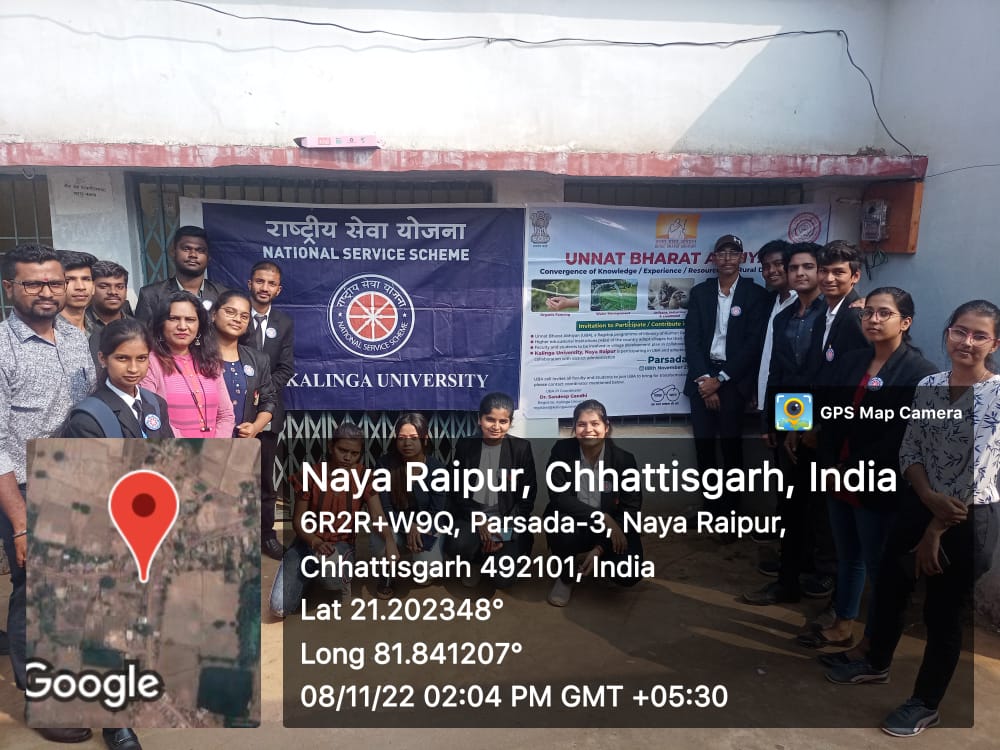
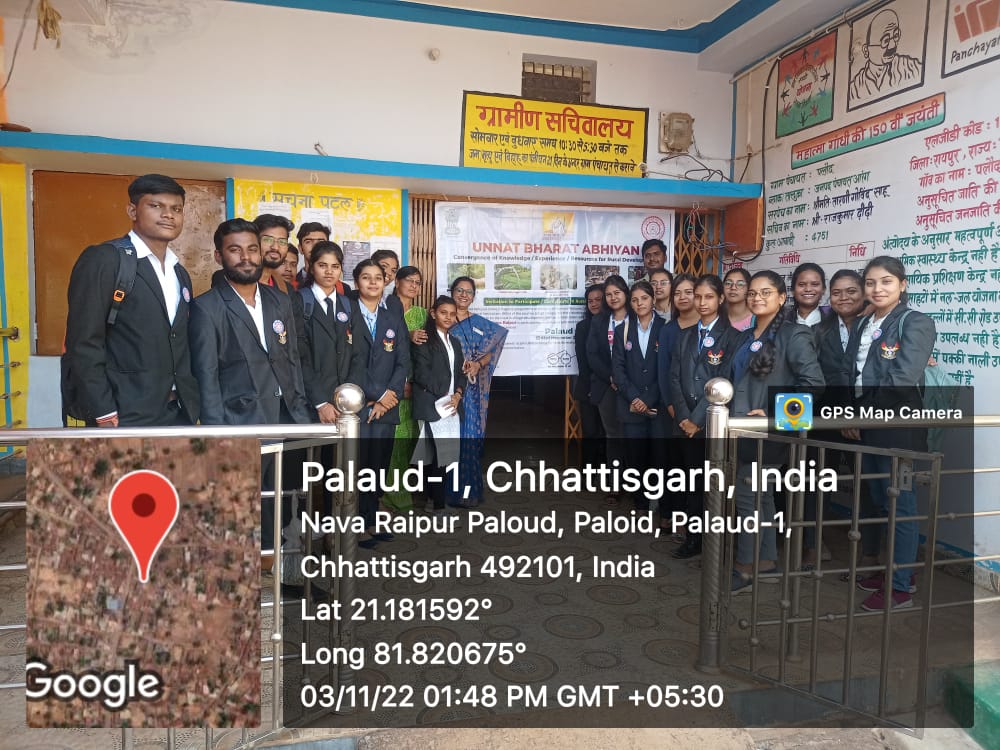
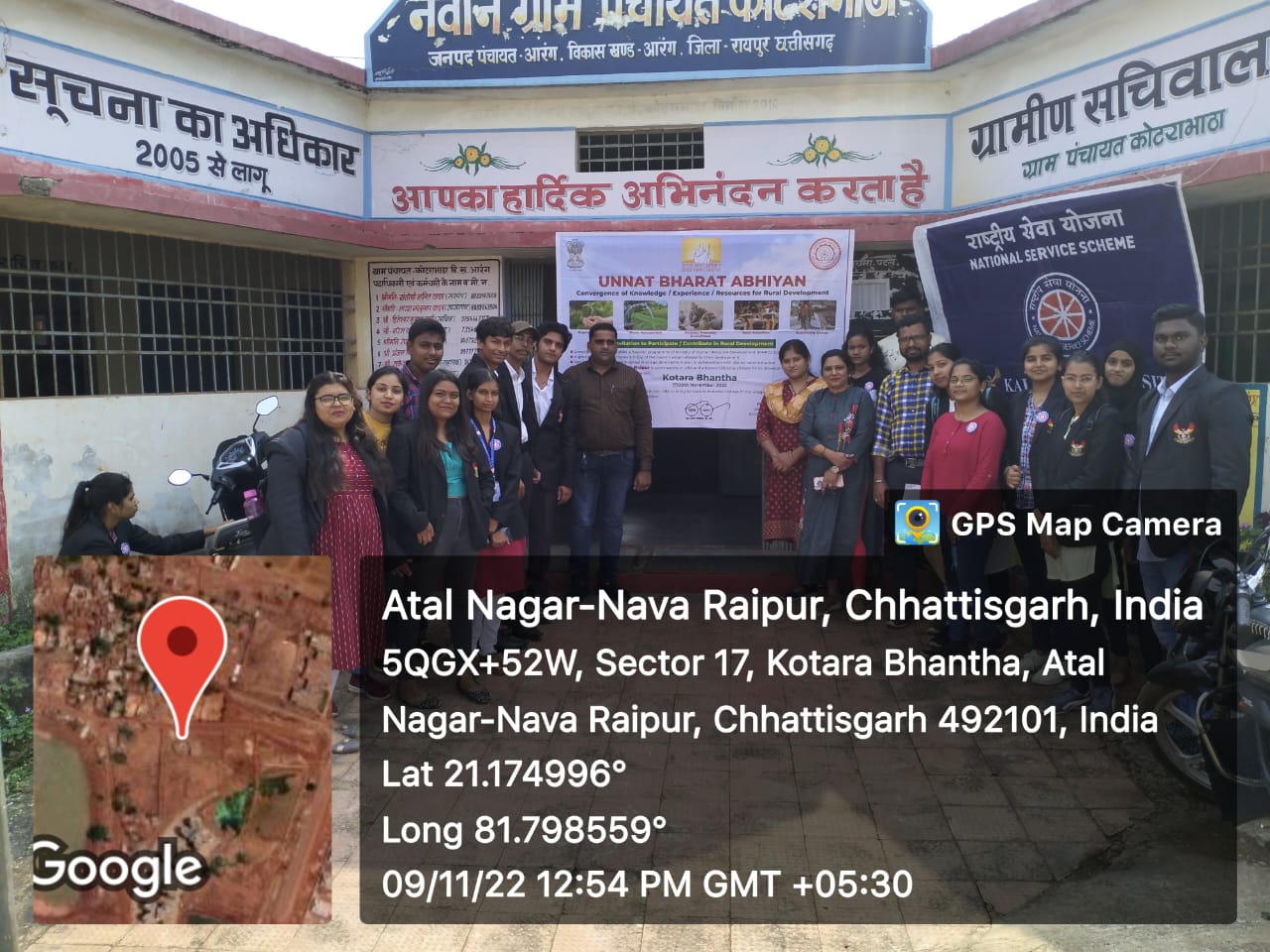
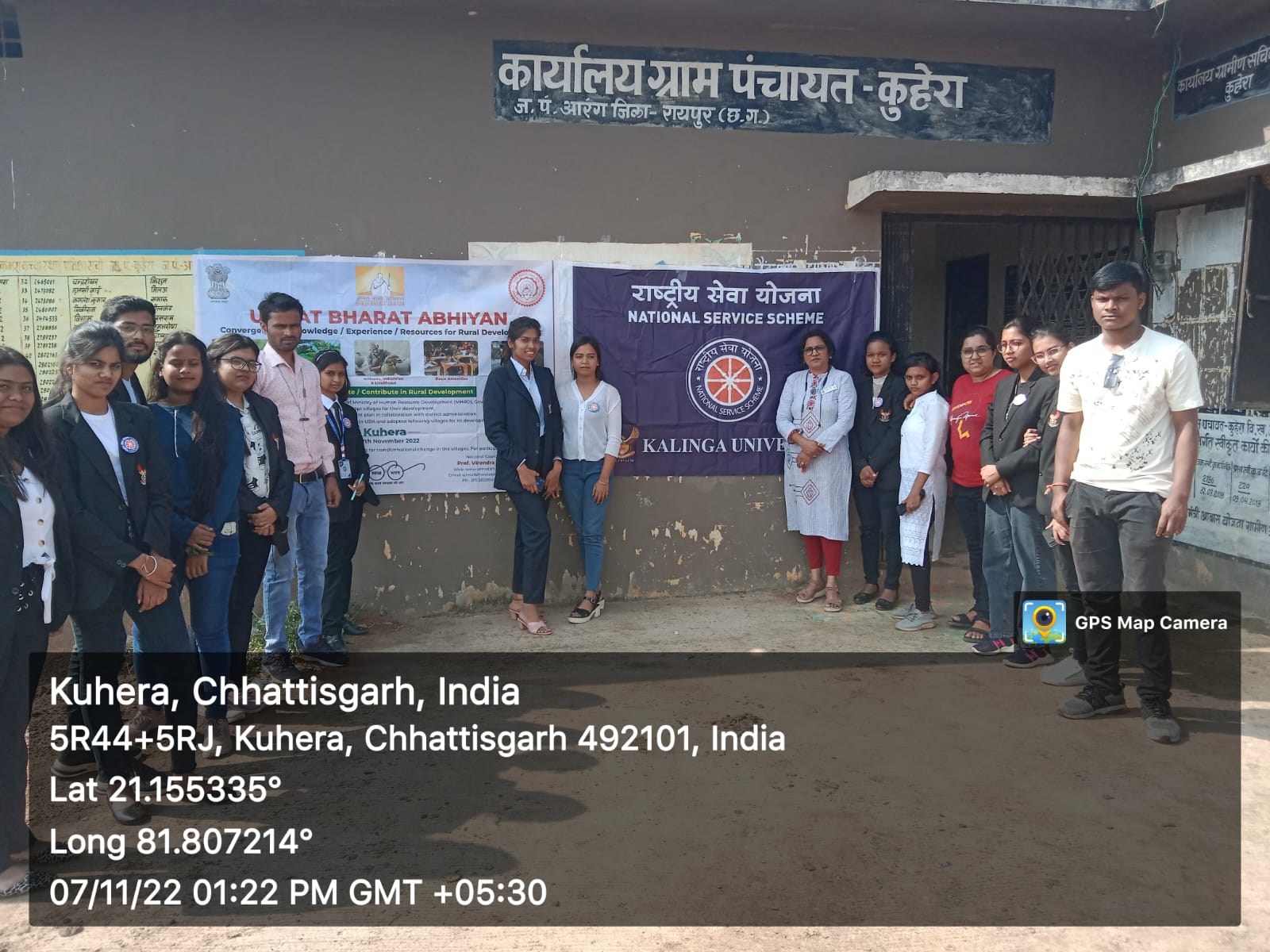
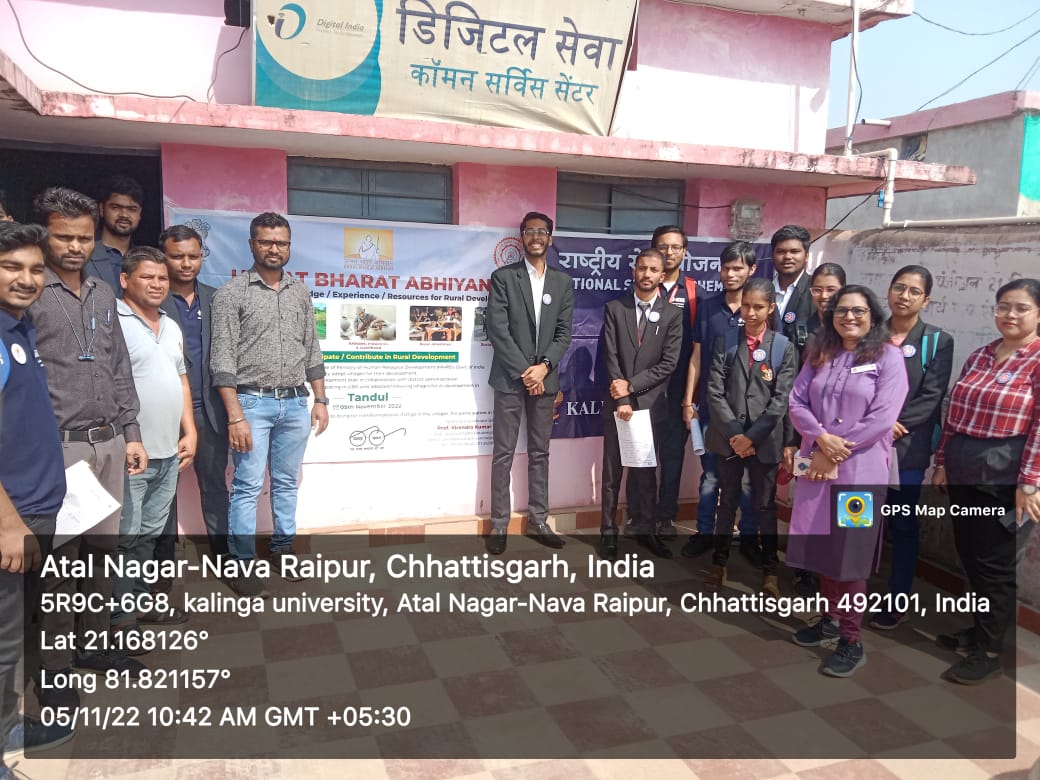
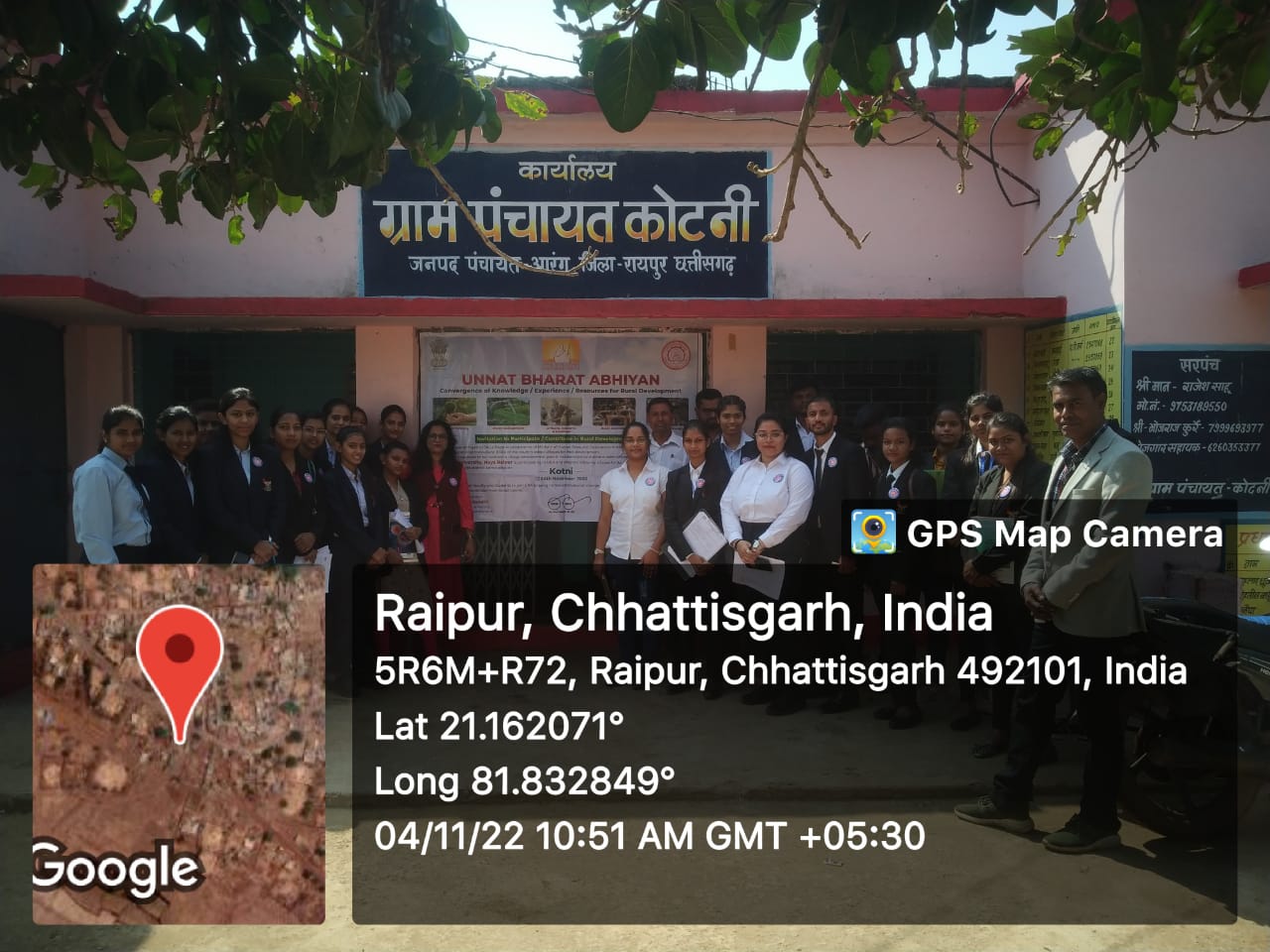
In alignment with the Unnat Bharat Abhiyan, the Faculty of Arts and Humanities at Kalinga University undertook a donation drive program with a focus on supporting the residents of the Khapri slum area, near BALCO Hospital, Naya Raipur. A dedicated team of approximately 13 students, alongside esteemed faculty members, Dr. A. Rajshekhar (Department of Geography), Dr. Aakriti Dewangan (Department of Social Work, and Dr. Wafi Ahmed Khan ( Department of Sociology) and Mr. Anand Jangde (Data Entry Operator), played instrumental roles in organizing, supervising, and participating in the program.
During the drive, a substantial number of approximately 350-400 clothing items were thoughtfully distributed to roughly 50 households in the Khapri slum area. Beyond the immediate material assistance provided, this initiative symbolizes the commencement of an enduring effort aimed at creating a lasting positive impact on the well-being and living conditions of the community. This initiative underscores Kalinga University's unwavering dedication to community engagement and social responsibility, embodying its commitment to making a meaningful contribution to the communities it serves




5. Name of Activity: Guest lecture on “Funding Opportunities on Humanitarian Projects to Meet SDG’s through IEEE”
Dr. Vijayalaxmi Biradar, Director IQAC at Kalinga University was invited to deliver a talk on funding opportunities on Humanitarian Projects to Meet SDG’s through IEEE to NIT Raipur as invited by Dr. Sudhakar Pandey, Regional coordinator, UBA, NITRR. As both IEEE and UBA provides funds for various activities for the society in a form of project, the event was intended to give awareness about the opportunities through these bodies. The event was conducted on 23-02-2023 at Auditorium, National Institute of Technology Raipur (RCI)

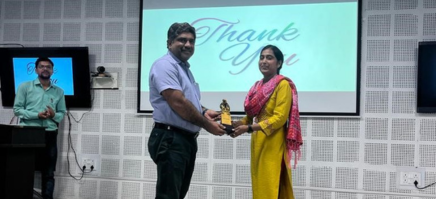
6. Name of Activity: Guest lecture on “Funding Opportunities on Humanitarian Projects to Meet SDG’s through IEEE”
Dr. Vijayalaxmi Biradar, Director IQAC at Kalinga University was invited to deliver a talk on funding opportunities on Humanitarian Projects to Meet SDG’s through IEEE to NIT Durgapur as invited by Dr. Krishna Rai, RCI Coordinator, UBA, NIT Durgapur. As both IEEE and UBA provides funds for various activities for the society in a form of project, the event was intended to give awareness about the opportunities through these bodies. The event was conducted on 20-03-2023 online mode.


Faculty Of Engineering and Technology
Fee Structure Session 2019-20 (For Chhattisgarh Only )
FACULTY OF MANAGEMENT STUDIES |
|||||||||
SL |
Name of Course |
Tenure |
Mode |
Eligibility |
Tuition Fee (Per Sem) |
Prospectus Fee |
Caution Money (Refundable) |
Total Fee |
|
Sem |
Year |
||||||||
|
1 |
BBA |
6 |
3 |
Sem |
10+2 |
40000 |
1000 |
2000 |
243000 |
|
2 |
B
BA |
6 |
3 |
Sem |
10+2 |
50000 |
1000 |
2000 |
303000 |
|
3 |
M
BA
|
4 |
2 |
Sem |
Graduation |
75000 |
1000 |
2000 |
303000 |
|
4 |
MBA (Dual Specialization) |
4 |
2 |
Sem |
Graduation |
75000 |
1000 |
2000 |
303000 |
|
5 |
Executive MBA (Single Specialization) |
2 |
1 |
Sem |
Graduation+ Minimum 2 years Work Experience |
75000 |
1000 |
2000 |
153000 |
NOTE:1. Merit & Girl Students Scholarships are available on Tuition Fees. (Kindly go through the website) 2.Speci alizat ion of MBA (Select any Two) & Executive MBA (Select any One) Ma rketing, Human Resource, Finance, E- Commerce, Digital Marketing, Hospital Management, International Business, Banking, Economics, International Relations, Public Relations Specialization for BBA (Select any one) - Marketing, Human Resource, Finance, Mass Media, E- Commerce, Banking & Finance, Digital Marketing, Economics, International Relations, Public Relations 3.Latera l Entry to MBA 3rd Semester on the basis of PGDBM from an AICTE approved Institution or a recognized University 4. Latera l Entry Fees. Rs. 3000/- (If Applicable) 5. Credit Transfer Fees Rs. 5000/- (If Applicable) 6. Student is entitled to issue 2 books from Library for 15 days. 7. Transpor t Charges From Bhilai Rs. 8000/- Per Semester, Patan, Siltara,Urla & Mandhar to Campus Rs. 7500/- per semester, from Durg, Mahasamund, Tilda & Simga it is Rs. 8500/- per semester, From Bhansoj Rs. 6500/- Per Semester, from Rajim & Beergaon is Rs. 7000/- Per Semester and within Raipur city, Arang & Abhanpur is Rs.6000/- per semester. 8. Unif orm charges Rs. 3750/- as per actual from vendor. (Uniform Includes – 2 Trousers, 2 Shirts, 1 Blazer, 1 T- Shirt, 1 Tie, 1 Bag) 9. Charges for Hostel & Food : Go through with mentioned Link : click Here 10. Value Additions : - Short Term Internship Program based upon Opportunities from Business & Industry. (Optional) Certification Program on Personal Computer Application Course in Association with First Edu India Ltd. Training & Joint Certification on E- Commerce from First Edu India Ltd. Fr ee Coaching for BBA Students on Preparation for CAT & MAT and Banking & other competitive exams (Select any 1) Free Coaching for MBA Students on Banking and other competitive exams. Free Soft Skill & Personality Development Program (Spoken English, Group Discussions, Public Speaking, Management Games, Mock Interviews & Employability Training) |
|||||||||
Fee Structure ( Fee for Residents of India except Chhattisgarh )
FACULTY OF MANAGEMENT STUDIES |
|||||||||
|
SL |
Name of Course |
Tenure |
Mode |
Eligibility |
Tuition Fee (Per Sem) |
Prospectus Fee |
Caution Money (Refundable) |
Total Fee |
|
Sem |
Year |
||||||||
|
1 |
BBA |
6 |
3 |
Sem |
10+2 |
50000 |
1000 |
2000 |
303000 |
|
2 |
B
BA |
6 |
3 |
Sem |
10+2 |
60000 |
1000 |
2000 |
363000 |
|
3 |
M
BA
|
4 |
2 |
Sem |
Graduation |
90000 |
1000 |
2000 |
363000 |
|
4 |
MBA (Dual Specialization) |
4 |
2 |
Sem |
Graduation |
90000 |
1000 |
2000 |
363000 |
|
5 |
Executive MBA (Single Specialization) |
2 |
1 |
Sem |
Graduation+ Minimum 2 years Work Experience |
90000 |
1000 |
2000 |
93000 |
NOTE:1. Merit & Girl Students Scholarships are available on Tuition Fees. (Kindly go through the website) 2. Speci alizat ion of MBA (Select any Two) & Executive MBA (Select any One) Ma rketing, Human Resource, Finance, E- Commerce, Digital Marketing, Hospital Management, International Business, Banking, Economics, International Relations, Public Relations Specialization for BBA (Select any one) - Marketing, Human Resource, Finance, Mass Media, E- Commerce, Banking & Finance, Digital Marketing, Economics, International Relations, Public Relations 3.Latera l Entry to MBA 3rd Semester on the basis of PGDBM from an AICTE approved Institution or a recognized University 4. Latera l Entry Fees. Rs. 3000/- (If Applicable) 5. Credit Transfer Fees Rs. 5000/- (If Applicable) 6. Student is entitled to issue 2 books from Library for 15 days. 7. Transpor t Charges From Bhilai Rs. 8000/- Per Semester, Patan, Siltara,Urla & Mandhar to Campus Rs. 7500/- per semester, from Durg, Mahasamund, Tilda & Simga it is Rs. 8500/- per semester, From Bhansoj Rs. 6500/- Per Semester, from Rajim & Beergaon is Rs. 7000/- Per Semester and within Raipur city, Arang & Abhanpur is Rs.6000/- per semester. 8. Unif orm charges Rs. 3750/- as per actual from vendor. (Uniform Includes – 2 Trousers, 2 Shirts, 1 Blazer, 1 T- Shirt, 1 Tie, 1 Bag) 9.Charges for Hostel & Food : Go through with mentioned Link : Click Here 10. Value Additions : - Short Term Internship Program based upon Opportunities from Business & Industry. (Optional) Certification Program on Personal Computer Application Course in Association with First Edu India Ltd. Training & Joint Certification on E- Commerce from First Edu India Ltd. Fr ee Coaching for BBA Students on Preparation for CAT & MAT and Banking & other competitive exams (Select any 1) Free Coaching for MBA Students on Banking and other competitive exams. Free Soft Skill & Personality Development Program (Spoken English, Group Discussions, Public Speaking, Management Games, Mock Interviews & Employability Training) |
|||||||||
© 2015 Kalinga University. Powered by: Clock Softsolutions Ltd.